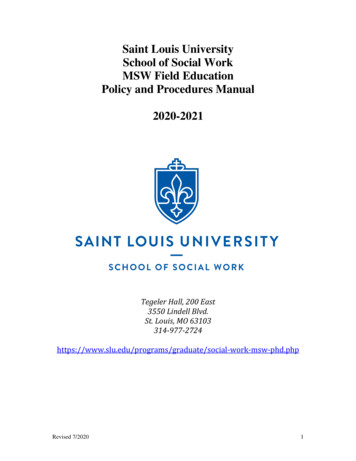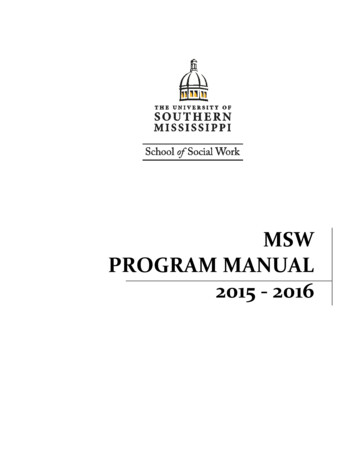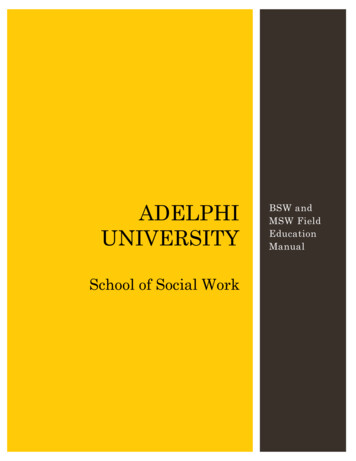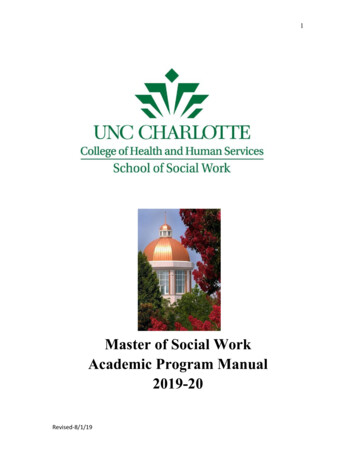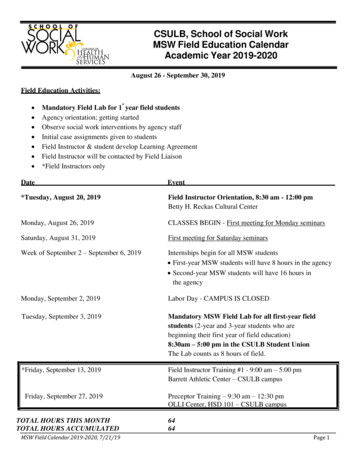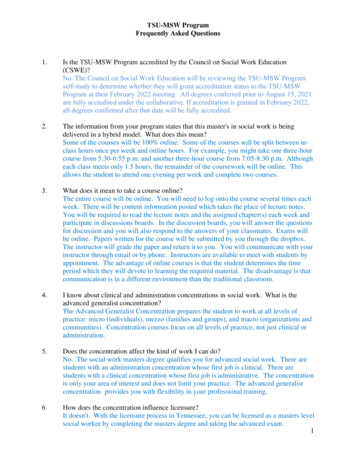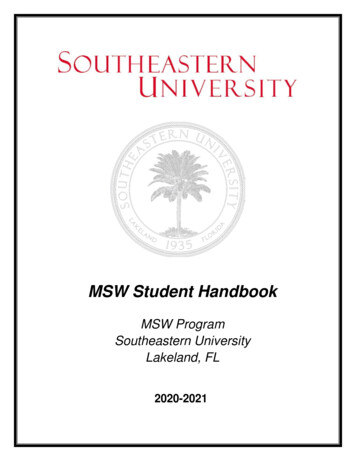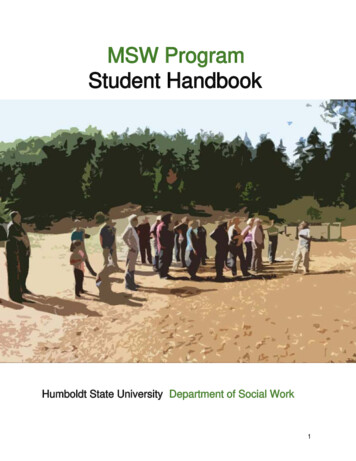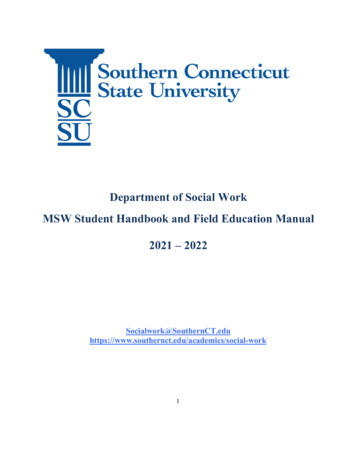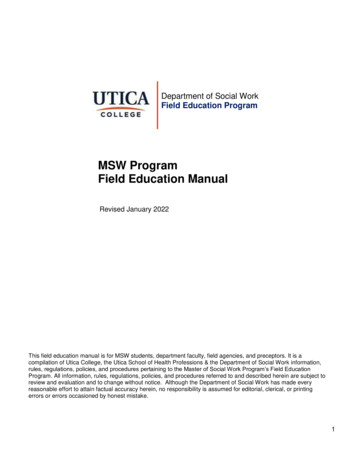
Transcription
PAGE10Department of Social WorkField Education ProgramMSW ProgramField Education ManualRevised January 2022This field education manual is for MSW students, department faculty, field agencies, and preceptors. It is acompilation of Utica College, the Utica School of Health Professions & the Department of Social Work information,rules, regulations, policies, and procedures pertaining to the Master of Social Work Program’s Field EducationProgram. All information, rules, regulations, policies, and procedures referred to and described herein are subject toreview and evaluation and to change without notice. Although the Department of Social Work has made everyreasonable effort to attain factual accuracy herein, no responsibility is assumed for editorial, clerical, or printingerrors or errors occasioned by honest mistake.1
PAGETable of Contents10Welcome to Field Education4About the Utica College MSW ProgramProgram Mission Statements55Planning for Field WorkIntegration Between Classroom and FieldField Education RequirementsThe Field Learning AgreementField Education Policy & Standards:CSWE 2015 Educational Policy & Standards (EPAS)Generalist Sequence CompetenciesSpecialization Sequence Competencies66788Purpose of Social Work Field EducationOverview and Objectives of Field EducationRoles & Responsibilities of all Parties Involved in Field Education161616Preparing for FieldCriteria for Admission into Field EducationProcess for Continuation in Field EducationSelection of PreceptorsUnqualified Preceptor or Early Preceptor TerminationSelection of Field AgenciesProcedures for Becoming an Approved Field Education SiteEvaluating Field Agency EffectivenessCredit for Work ExperienceEmployment-Based Field Education Placements21222324262728282929Policies and Procedures in Field EducationPlacement of Students into Field AgenciesMonitoring Students in Field Education PlacementsRequired PaperworkOrientation to the FieldContinuing Dialogue with Field Settings and Field Seminar Instructor313133343437Safety and Risk ManagementBest Practices to Promote a Successful PlacementHealth, Medical, & BackgroundUse of Personal Automobile & Automobile InsuranceLiability InsuranceInternet Access, Computers, & Electronic Devices374141424243Professional Ethics and NASW Ethical PrinciplesDual RelationshipsSupervisionStability of Field Settings434344449102
PAGEField Termination45 10Required Field Hours and Progress in Field45Academic, Professional, and Ethical Conduct46Problem ResolutionPerformance Improvement PlansGrievance Procedures474747Evaluation of Student Learning48AppendicesI. Acknowledgement of Criminal Background Check & Other Field RequirementsII. MSW Field Learning AgreementIII. Field Site Orientation -Required Activities ChecklistIV. Internship QuestionnaireV. Field Site Interest FormVI. Council on Social Work Education -DOL RegulationsVII. Field Assessment Survey of Student QualitiesVIII.Field Educator Evaluation of Field Agency & Field PreceptorIX. Employment Based PracticaX. Field Placement TimesheetXI. Acknowledgement of Risk and Consent for Treatment for Internship ParticipantsXII. Weekly Supervision FormXIII. Termination of PlacementXIV. Student’s Evaluation of Field Placement Experience5052575963666768697071727374Welcome to Field EducationWe are delighted to welcome you as you begin your practical, hands-on learningexperience to discover what we do as social workers. We want your journey to be both3
exciting and rewarding. The MSW Field Program at Utica College comprises of a stellarteam of faculty, staff, and administrators that will accompany you on your journey.PAGE10Thank you for choosing Utica College as your choice in advancing your skills andknowledge as a social worker. Our uniquely focused recovery-oriented program will focusnot only on the content in the academic environment but also on your field experience.The field team will work closely with you to ensure that your field experience will allow youto bridge the theoretical knowledge of the recovery model learned in the classroom overinto practice in the community with real clients.The field experience with Utica College will be one to treasure indeed. We are aunique program that will allow you to engage in field learning with required coursessimultaneously. You will have the ability to process your field experiences with your peersand social work faculty.We acknowledge how difficult it may be for some students to commit to a rigid fieldschedule that would mimic the time and commitment of a full-time job. Thus, we havedesigned a field program that allows students to work as little as 7-14 hours a week at anapproved community agency. Even with such a minimum time commitment to fieldlearning, we still expect students to professionally and maturely handle the complexitiesand rigors of managing school, work, and practicum (also referred to as field learning andinternship). Your journey is no small feat; however, you will have a team of experiencedprofessionals in which most have taken the same academic and field learning pathtowards becoming a skilled social worker.Your success lies in your ability to commit to learning. Commit to building solidrelationships with your peers, instructors, preceptors, field team, and a host of others atUtica College and at your field site. Embrace feedback and constructive criticism, as youwill find that it will aid you in becoming a better professional. Be mindful of your clients andtheir sensitive lives and stories. Embrace your field learning experience as asteppingstone to a brotherhood and sisterhood of social justice warriors.This field education manual is the first descriptive and informative piece about theMSW Field Learning Program at Utica College. You are expected to read it in its entirety asyou are responsible for being knowledgeable of the contents herein. While a host of otherresources will be available to aid you on your field journey, you should refer back here forquestions you have about the field learning process and experience.We again welcome you, and we look forward to working with you as yougrow and progress in the field program.-MSW Faculty, Staff, & AdministratorsAbout the Utica College MSW ProgramProgram Mission Statements4
PAGE10Program Mission StatementThe mission of the MSW program at Utica College is to preparestudents for excellence in the practice of clinical social work usingevidence-based, recovery-oriented approaches. The MSW programunderstands the challenges arising from tensions between the personand their environment, with cumulative traumas from developmental,social, and systemic forces building over the life course to impedeupon individuals’ ability to thrive and create vulnerabilities to illness.With this in mind, in order to build the human relationships thatfacilitate post-traumatic growth for individuals, families, and groups, it isessential for clinical social workers to consider historic and institutionalpressures alongside personal and interpersonal experiences ofdistress, intervening through clinical practice while addressing thepolicy, economic, and institutional contexts of the work.Field Education Mission StatementThe mission of the social work field education program is to create afusion of classroom knowledge and real-world experiential learning toproduce social work scholars and recovery model practitioners to carryon the traditions of social work practice that improves human wellbeing, empower the vulnerable & oppressed, promote social justice &social change, all while being sensitive to the needs of all systemsindividuals, families, groups, organizations, and communities.5
PAGEPlanning for Field Work10Students in the MSW Program at UC need to plan for a successful educational process and graduationby becoming fully familiarized with the MSW curriculum and course sequencing. The field work coursesrequire students to be performing tasks at an approved field agency with regular weekly supervision froman MSW who is approved by the UC MSW program. These tasks will be designed to assure studentlearning that will promote mastery of 9 competencies specified by CSWE. Students need to be awarewhen seeking admission to the MSW program that they will need to have the requisite attributes topromote successful outcomes in the field. These include sufficient time to fulfill all required field hours,willingness to undergo all required background checks and/or fingerprinting as specified, and ability tophysically, emotionally and socially fulfill all required tasks assigned in the field education setting. Anyconcerns a student may have about what they require to be successful in the field should be discussedwith the Director of Field Education or Program Director to determine an individualized plan to bestaddress any concerns identified.Integration Between Classroom and FieldThroughout the generalist level, students will be taking field work seminars in which they will besynthesizing content from academic courses and learning to navigate their experiences in direct andmacro level practice concurrently in the field agency. Through the specialization course sequence,beginning in the fifth semester, they will be offered the opportunity to reflect on what works and whatdoesn’t work (see Appendix 14).To integrate theory and practice, we use a model in which preceptors usher students through the journeyof learning to make conscious and concrete their implicit values and beliefs that they developed in theireducational pathways and experience. This is achieved through seminars in field instruction provided byUtica College. All approved agencies and identified preceptors must undergo an initial training referred toas Seminar Training in Field Instruction (SIFI).Additional on-going and optional training will be offered throughout the year for agencies and identifiedpreceptors.While participating in field education (field internship and field education course), the student socialworker reflects on this through insight and self-awareness, understanding one’s own cognitive andaffective reactions, comparing and contrasting the experiences of the moment to those of the past thatmight be relevant. This is where practice knowledge comes from the generalized realm and becomes6
PAGEdirectly applicable to the professional situation in which the student and client find themselves. The10finalstep is when the social worker is motivated to action and has a professional response. The social workerdesigns a course of action that may be appropriate for immediate action or target a longer-termintervention plan that will ultimately suit the client’s needs and concerns.To achieve this, the Utica College Social Work Program works on a delayed model wherein studentsbegin their academic coursework one semester before being placed in a field placement. Once they areplaced in internships, students will weekly receive 1.5 hours of individual or group supervision fromthe on-site preceptor and field instructor, as well as additional feedback and guidance from Utica Collegefield personnel, including the field director, field coordinator, and field seminar instructor. Students willhave an alternating schedule for field supervision weekly. One week students will receive individualsupervision from the preceptor. The following week, the student will participate in group supervision withthe field seminar instructor.A field seminar course must be completed every semester in which students participate in field work, andbeginning in the first semester in the field, students begin to conceptualize the ways in which traditionalclinical social work models of practice are consistent with or divergent from recovery models of practice.Field seminars have both synchronous (1.5 hour live sessions) and asynchronous (discussion boards,content to review online, specific activities to engage in between live sessions) content.Field Education RequirementsAll field education experiences must be completed through placements at a Program-approved field site.Each facility has its own requirements that must be met before a student can be accepted for a fieldplacement. Students are responsible for meeting the assigned facility’s requirements. The Program is notresponsible for securing placements for students who are unable to meet a facility’s placementrequirements. The financial cost to meet the agency’s many requirements is the responsibility of thestudent; these costs are mostly not included in tuition and fees and are generally not covered by financialaid. Requirements may include, but are not limited to Cover Letter & ResumeCriminal background checksFingerprintingProof of ImmunizationsTuberculosis ScreeningSeasonal Influenza VaccineCovid-19 VaccinePhysical Health Examination7
Proof of Valid Driver’s LicenseProof of Automobile InsurancePAGE10Students must sign the Background Check and other Field Requirements Disclosure form prior to fieldplacement approval (see Appendix 1).Along with the weekly field supervision and participation in the corresponding field seminar coursementioned in the above section, students are required to develop a Field Learning Agreement thatarticulates the tasks and responsibilities in which they will engage throughout the generalist yearinternship and specialization (advanced standing) internships (see Appendix 2).The Field Learning AgreementThe Field Learning Agreement will be due within the first three weeks of the internship start date.Tasks should include direct practice with a caseload of clients, mezzo, and macro work (e.g., speaking atcity council, grant writing, policy development, community needs).A field site orientation must also commence within the two weeks of the internship start date. A requiredactivities checklist will be provided to the student that will detail the minimum field site orientation topics(see Appendix 3). In addition, as outlined in the activities checklist, the student shall provide thePreceptor with the following items: A copy of the field seminar course syllabus.A copy of the field learning agreement form.Field Education Policy & Standards:CSWE 2015 Educational Policy and Standards (EPAS)Graduates of the UC MSW Program will have successfully demonstrated competency in the 9 areasidentified below by the Council on Social Work Education. These competencies are taught during boththe generalist sequence and specialist sequence at field education sites and during accompanying fieldcourse. Mastery of each competency is displayed through a series of observable behaviors, which areoutlined in the Learning Contract and Field Evaluation forms. More information about the Council onSocial Work Education and the 2015 Educational and Policy Accreditation Standards can be found atwww.cswe.org.8
Generalist Sequence CompetenciesPAGE10Competency 1: Demonstrate Ethical and Professional BehaviorSocial workers understand the value base of the profession and its ethical standards, as well as relevant laws andregulations that may impact practice at the micro, mezzo, and macro levels. Social workers understand frameworksof ethical decision-making and how to apply principles of critical thinking to those frameworks in practice, research,and policy arenas. Social workers recognize personal values and the distinction between personal and professionalvalues. They also understand how their personal experiences and affective reactions influence their professionaljudgment and behavior. Social workers understand the profession’s history, its mission, and the roles andresponsibilities of the profession.Social Workers also understand the role of other professions when engaged in inter-professional teams. Socialworkers recognize the importance of life-long learning and are committed to continually updating their skills toensure they are relevant and effective. Social workers also understand emerging forms of technology and theethical use of technology in social work practice. Social workers: make ethical decisions by applying the standards of the NASW Code of Ethics, relevant laws andregulations, models for ethical decision-making, ethical conduct of research, and additional codes of ethics asappropriate to context; use reflection and self-regulation to manage personal values and maintain professionalism in practicesituations; demonstrate professional demeanor in behavior; appearance; and oral, written, and electroniccommunication; use technology ethically and appropriately to facilitate practice outcomes; and use supervision and consultation to guide professional judgment and behavior.Competency 2: Engage Diversity and Difference in PracticeSocial workers understand how diversity and difference characterize and shape the human experience and arecritical to the formation of identity. The dimensions of diversity are understood as the intersectionality of multiplefactors including but not limited to age, class, color, culture, disability and ability, ethnicity, gender, gender identityand expression, immigration status, marital status, political ideology, race, religion/spirituality, sex, sexualorientation, and tribal sovereign status. Social workers understand that, as a consequence of difference, a person’slife experiences may include oppression, poverty, marginalization, and alienation as well as privilege, power, andacclaim. Social workers also understand the forms and mechanisms of oppression and discrimination andrecognize the extent to which a culture’s structures and values, including social, economic, political, and culturalexclusions, may oppress, marginalize, alienate, or create privilege and power.Social workers: apply and communicate understanding of the importance of diversity and difference in shaping lifeexperiences in practice at the micro, mezzo, and macro levels; present themselves as learners and engage clients and constituencies as experts of their ownexperiences; and apply self-awareness and self-regulation to manage the influence of personal biases and values in workingwith diverse clients and constituencies.Competency 3: Advance Human Rights and Social, Economic, and Environmental JusticeSocial workers understand that every person regardless of position in society has fundamental human rights such as9
PAGEfreedom, safety, privacy, an adequate standard of living, health care, and education. Social workers understand the10global interconnections of oppression and human rights violations, and are knowledgeable about theories of humanneed and social justice and strategies to promote social and economic justice and human rights. Social workersunderstand strategies designed to eliminate oppressive structural barriers to ensure that social goods, rights, andresponsibilities are distributed equitably and that civil, political, environmental, economic, social, and cultural humanrights are protected. Social workers: apply their understanding of social, economic, and environmental justice to advocate for human rights at theindividual and system levels; and engage in practices that advance social, economic, and environmental justice.Competency 4: Engage In Practice-informed Research and Research-informed PracticeSocial workers understand quantitative and qualitative research methods and their respective roles in advancing ascience of social work and in evaluating their practice. Social workers know the principles of logic, scientific inquiry,and culturally informed and ethical approaches to building knowledge. Social workers understand that evidencethat informs practice derives from multi-disciplinary sources andmultiple ways of knowing. They also understandthe processes for translating research findings into effective practice. Social workers: use practice experience and theory to inform scientific inquiry and research; apply critical thinking to engage in analysis of quantitative and qualitative research methods andresearch findings; use and translate research evidence to inform and improve practice, policy, and service delivery.Competency 5: Engage in Policy PracticeSocial workers understand that human rights and social justice, as well as social welfare and services, aremediated by policy and its implementation at the federal, state, and local levels. Social workers understand thehistory and current structures of social policies and services, the role of policy in service delivery, and the role ofpractice in policy development. Social workers understand their role in policy development and implementationwithin their practice settings at the micro, mezzo, and macro levels and they actively engage in policy practice toeffect change within those settings. Social workers recognize and understand the historical, social, cultural,economic, organizational, environmental, and global influences that affect social policy. They are alsoknowledgeable about policy formulation, analysis, implementation, and evaluation. Social workers: Identify social policy at the local, state, and federal level that impacts well-being, service delivery, and access tosocial services; assess how social welfare and economic policies impact the delivery of and access to social services; apply critical thinking to analyze, formulate, and advocate for policies that advance human rights and social,economic, and environmental justice.Competency 6: Engage with Individuals, Families, Groups, Organizations, and CommunitiesSocial workers understand that engagement is an ongoing component of the dynamic and interactive process ofsocial work practice with, and on behalf of, diverse individuals, families, groups, organizations, and communities.Social workers value the importance of human relationships. Social workers understand theories of human behaviorand the social environment, and critically evaluate and apply this knowledge to facilitate engagement with clientsand constituencies, including individuals, families, groups, organizations, and communities. Social workersunderstand strategies to engage diverse clients and constituencies to advance practice effectiveness.Social workers understand how their personal experiences and affective reactions may impact their ability toeffectively engage with diverse clients and constituencies. Social workers value principles of relationship-building10
PAGEand inter professional collaboration to facilitate engagement with clients, constituencies, and other professionals as10appropriate. Social workers: apply knowledge of human behavior and the social environment, person-in-environment, and othermultidisciplinary theoretical frameworks to engage with clients and constituencies; and use empathy, reflection, and interpersonal skills to effectively engage diverse clients andconstituencies.Competency 7: Assess Individuals, Families, Groups, Organizations, and CommunitiesSocial workers understand that assessment is an ongoing component of the dynamic and interactive process ofsocial work practice with, and on behalf of, diverse individuals, families, groups, organizations, and communities.Social workers understand theories of human behavior and the social environment, and critically evaluate and applythis knowledge in the assessment of diverse clients and constituencies, including individuals, families, groups,organizations, and communities. Social workers understand methods of assessment with diverse clients andconstituencies to advance practice effectiveness. Social workers recognize the implications of the larger practicecontext in the assessment process and value the importance of interprofessional collaboration in this process. Socialworkers understand how their personal experiences and affective reactions may affect their assessment anddecision-making.Social workers: collect and organize data, and apply critical thinking to interpret information from clients andconstituencies; apply knowledge of human behavior and the social environment, person-in-environment, and othermultidisciplinary theoretical frameworks in the analysis of assessment data from clients and constituencies; develop mutually agreed-on intervention goals and objectives based on the critical assessment of strengths,needs, and challenges within clients and constituencies; and select appropriate intervention strategies based on the assessment, research knowledge, and values andpreferences of clients and constituencies.Competency 8: Intervene with Individuals, Families, Groups, Organizations, and CommunitiesSocial workers understand that intervention is an ongoing component of the dynamic and interactive process ofsocial work practice with, and on behalf of, diverse individuals, families, groups, organizations, and communities.Social workers are knowledgeable about evidence-informed interventions to achieve the goals of clients andconstituencies, including individuals, families, groups, organizations, and communities. Social workers understandtheories of human behavior and the social environment, and critically evaluate and apply this knowledge toeffectively intervene with clients and constituencies. Social workers understand methods of identifying, analyzingand implementing evidence informed interventions to achieve client and constituency goals. Social workers valuethe importance of inter professional teamwork and communication in interventions, recognizing that beneficialoutcomes mayrequire interdisciplinary, inter- professional, and inter-organizational collaboration. Social workers: critically choose and implement interventions to achieve practice goals and enhance capacities of clients andconstituencies; apply knowledge of human behavior and the social environment, person-in-environment, and othermultidisciplinary theoretical frameworks in interventions with clients and constituencies; use interprofessional collaboration as appropriate to achieve beneficial practice outcomes; negotiate, mediate, and advocate with and on behalf of diverse clients and constituencies; and11
facilitate effective transitions and endings that advance mutually agreed-on goals.PAGE10Competency 9: Evaluate Practice with Individuals, Families, Groups, Organizations, andCommunitiesSocial workers understand that evaluation is an ongoing component of the dynamic and interactive process of socialwork practice with, and on behalf of, diverse individuals, families, groups, organizations and communities. Socialworkers recognize the importance of evaluating processes and outcomes to advance practice, policy, and servicedelivery effectiveness. Social workers understand theories of human behavior and the social environment, andcritically evaluate and apply this knowledge in evaluating outcomes. Social workers understand qualitative andquantitative methods for evaluating outcomes and practice effectiveness.Social workers: select and use appropriate methods for evaluation of outcomes; apply knowledge of human behavior and the social environment, person-in-environment, and othermultidisciplinary theoretical frameworks in the evaluation of outcomes; critically analyze, monitor, and evaluate intervention and program processes and outcomes; and apply evaluation findings to improve practice effectiveness at the micro, mezzo, and macro levels.Specialization Sequence CompetenciesCompetency 1: Demonstrate Ethical and Professional BehaviorClinical social workers take measures of self-care and seek support in developing awareness, insight, andresiliency to prevent past traumas and retraumatization from impacting their professional lives; they monitor rolesand boundaries, understanding that boundary crossing, transparency, or disclosure may be helpful when executedcarefully under specific circumstances with certain clients; and they leverage supervision and consultation to ensurecontinued personal and professional growth throughout their careers. Clinical social workers should be aware oftheir own lived experiences of trauma and distress; their personal journeys toward resilience and mental health;they should be aware of the impact of these experiences on their own lives; and also aware of how theseexperiences may affect their work and relationships. They understand the values of the social work profession, itsethical standards, and applicable laws and policies, and use these professional parameters to guide decisionmaking. This would be demonstrated in the field by way of: prioritizing service user lived experience to inform the development of services, policy,administration procedures, and research;setting and monitoring appropriate boundaries;working toward developing self-awareness and insight;practicing self-care;seeking consultation and supervision;tolerating ambiguity in resolving ethical conflicts;addressing macro and system-level concerns as part of delivering recovery-oriented clinical socialwork services; andarticulating how recovery-oriented practice is supported by the NASW Code of Ethics.Competency 2: Engage Diversity and Difference in PracticeClinical social workers appreciate nuance and intersectionality of identity the ways in which institutional and12
PAGEinterpersonal traumas converge with other factors to produce marginalization and otherness. The dimensions of10diversity are understood as the intersectionality of multiple factors including age, class, color, culture, disability,ethnicity, gender identity and expression, lived experience of recovery, immigration status, political ideology, race,religion, size, sex, and sexual orientation. They recognize that diversity and difference affect a person’s experiencesin life in ways that may include oppression, poverty, marginalization, and alienation or offer privilege, power, andacclaim. Clinical social workers understand historical, contemporary, and non-Western differences in constructionsof mental health. They recognize the role that internalized oppression and shame plays in clients’ lives. Clinicalsocial workers are also attuned to the role that
This field education manual is for MSW students, department faculty, field agencies, and preceptors. It is a compilation of Utica College, the Utica School of Health Professions & the Department of Social Work information, rules, regulations, policies, and procedures pertaining to the Master of Social Work Program's Field Education Program.
